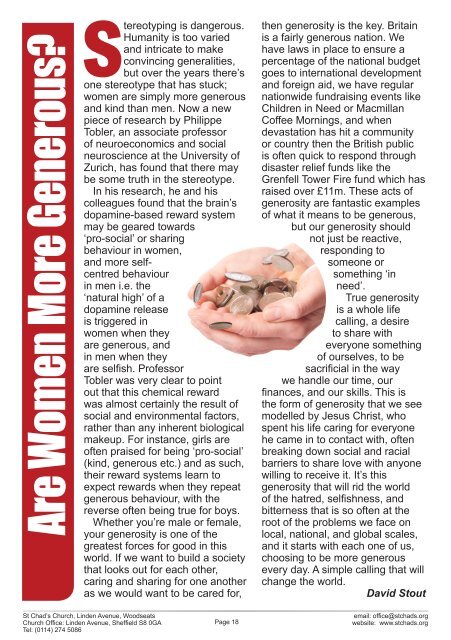Impact1217
Create successful ePaper yourself
Turn your PDF publications into a flip-book with our unique Google optimized e-Paper software.
Are Women More Generous?<br />
Stereotyping is dangerous.<br />
Humanity is too varied<br />
and intricate to make<br />
convincing generalities,<br />
but over the years there’s<br />
one stereotype that has stuck;<br />
women are simply more generous<br />
and kind than men. Now a new<br />
piece of research by Philippe<br />
Tobler, an associate professor<br />
of neuroeconomics and social<br />
neuroscience at the University of<br />
Zurich, has found that there may<br />
be some truth in the stereotype.<br />
In his research, he and his<br />
colleagues found that the brain’s<br />
dopamine-based reward system<br />
may be geared towards<br />
‘pro-social’ or sharing<br />
behaviour in women,<br />
and more selfcentred<br />
behaviour<br />
in men i.e. the<br />
‘natural high’ of a<br />
dopamine release<br />
is triggered in<br />
women when they<br />
are generous, and<br />
in men when they<br />
are selfish. Professor<br />
Tobler was very clear to point<br />
out that this chemical reward<br />
was almost certainly the result of<br />
social and environmental factors,<br />
rather than any inherent biological<br />
makeup. For instance, girls are<br />
often praised for being ‘pro-social’<br />
(kind, generous etc.) and as such,<br />
their reward systems learn to<br />
expect rewards when they repeat<br />
generous behaviour, with the<br />
reverse often being true for boys.<br />
Whether you’re male or female,<br />
your generosity is one of the<br />
greatest forces for good in this<br />
world. If we want to build a society<br />
that looks out for each other,<br />
caring and sharing for one another<br />
as we would want to be cared for,<br />
then generosity is the key. Britain<br />
is a fairly generous nation. We<br />
have laws in place to ensure a<br />
percentage of the national budget<br />
goes to international development<br />
and foreign aid, we have regular<br />
nationwide fundraising events like<br />
Children in Need or Macmillan<br />
Coffee Mornings, and when<br />
devastation has hit a community<br />
or country then the British public<br />
is often quick to respond through<br />
disaster relief funds like the<br />
Grenfell Tower Fire fund which has<br />
raised over £11m. These acts of<br />
generosity are fantastic examples<br />
of what it means to be generous,<br />
but our generosity should<br />
not just be reactive,<br />
responding to<br />
someone or<br />
something ‘in<br />
need’.<br />
True generosity<br />
is a whole life<br />
calling, a desire<br />
to share with<br />
everyone something<br />
of ourselves, to be<br />
sacrificial in the way<br />
we handle our time, our<br />
finances, and our skills. This is<br />
the form of generosity that we see<br />
modelled by Jesus Christ, who<br />
spent his life caring for everyone<br />
he came in to contact with, often<br />
breaking down social and racial<br />
barriers to share love with anyone<br />
willing to receive it. It’s this<br />
generosity that will rid the world<br />
of the hatred, selfishness, and<br />
bitterness that is so often at the<br />
root of the problems we face on<br />
local, national, and global scales,<br />
and it starts with each one of us,<br />
choosing to be more generous<br />
every day. A simple calling that will<br />
change the world.<br />
David Stout<br />
St Chad’s Church, Linden Avenue, Woodseats<br />
Church Office: Linden Avenue, Sheffield S8 0GA<br />
Tel: (0114) 274 5086<br />
Page 18<br />
email: office@stchads.org<br />
website: www.stchads.org

















